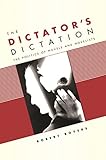The Dictator's Dictation : The Politics of Novels and Novelists / Robert Boyers.
Material type: TextPublisher: New York, NY : Columbia University Press, [2005]Copyright date: ©2005Description: 1 online resourceContent type:
TextPublisher: New York, NY : Columbia University Press, [2005]Copyright date: ©2005Description: 1 online resourceContent type: - 9780231136747
- 9780231510073
- 809/.39358/0904 22
- PN3503 .B653 2005
- PN3503 .B655 2005eb
- online - DeGruyter
- Issued also in print.
| Item type | Current library | Call number | URL | Status | Notes | Barcode | |
|---|---|---|---|---|---|---|---|
 eBook
eBook
|
Biblioteca "Angelicum" Pont. Univ. S.Tommaso d'Aquino Nuvola online | online - DeGruyter (Browse shelf(Opens below)) | Online access | Not for loan (Accesso limitato) | Accesso per gli utenti autorizzati / Access for authorized users | (dgr)9780231510073 |
Browsing Biblioteca "Angelicum" Pont. Univ. S.Tommaso d'Aquino shelves, Shelving location: Nuvola online Close shelf browser (Hides shelf browser)

|

|

|

|

|

|

|
||
| online - DeGruyter Space as a Strategic Asset / | online - DeGruyter The Mystique of Transmission : On an Early Chan History and Its Context / | online - DeGruyter Abandoned to Lust : Sexual Slander and Ancient Christianity / | online - DeGruyter The Dictator's Dictation : The Politics of Novels and Novelists / | online - DeGruyter Electric Sounds : Technological Change and the Rise of Corporate Mass Media / | online - DeGruyter Lhasa : Streets with Memories / | online - DeGruyter The Velvet Lounge : On Late Chicago Jazz / |
Frontmatter -- CONTENTS -- 1. THE INDIGENOUS BERSERK: PHILIP ROTH -- 2. IDENTITY AND DIFFIDENCE: SEAMUS DEANE -- 3. A GENEROUS MIND: NATALIA GINZBURG -- 4. CLEAR LIGHT AND SHADOW: ANITA DESAI -- 5. BULLETS OF MILK: JOHN UPDIKE -- 6. POLITICS AND POSTMODERNISM: MARIO VARGAS LLOSA -- 7. IN EXILE FROM EXILE: NORMAN MANEA -- 8. THE NORMALITY BLUES: PETER SCHNEIDER -- 9. DISCIPLINE AND PUNISH: FLEUR JAEGGY -- 10. PRIMACIES AND POLITICS: NADINE GORDIMER -- 11. THINKING ABOUT EVIL: KAFKA, NAIPAUL, COETZEE -- 12. PATHOS AND RESIGNATION: PAT BARKER -- 13. STIFLINGS: LÁSZLÓ KRASZNAHORKAI -- 14. THE DICTATOR'S DICTATION: AUGUSTO ROA BASTOS -- 15. MANY TYPES OF AMBIGUITY: INGEBORG BACHMANN -- 16. RUBBLE AND ICE: W. G. SEBALD -- SELECTED BIBLIOGRAPHY -- INTRODUCTION: THINKING ABOUT POLITICS AND THE NOVEL
restricted access online access with authorization star
http://purl.org/coar/access_right/c_16ec
In these elegant essays, many of them originally written for The New Republic and Harper's, Robert Boyers examines the role of the political imagination in shaping the works of such important contemporary writers as W. G. Sebald and Philip Roth, Nadine Gordimer and Mario Vargas Llosa, Natalia Ginzburg and Pat Barker, J. M. Coetzee and John Updike, V. S. Naipaul and Anita Desai. Occasionally he finds that politics actually figures very little in works that only pretend to be interested in politics. Elsewhere he discovers that certain writers are not equal to the political issues they take on or that their work is fatally compromised by complacency or wishful thinking.In the main, though, Boyers writes as a lover of great literature who wishes to understand how the best writers do justice to their own political obsessions without suggesting that everything is reducible to politics. Resisting the notion that novels can be effectively translated into ideas or positions, he resists as well the notion that art and politics must be held apart, lest works of fiction somehow be contaminated by their association with "real life" or public issues. The essays offer a combination of close reading, argument, and assessment.What, Boyers asks, is the relationship between form and substance in a work whose formal properties are particularly striking? Is it reasonable to think of a particular writer as "reactionary" merely because he presents an unflattering portrait of revolutionary activists or because he is less than optimistic about the future of newly independent societies? What is the status of private life in works set in politically tumultuous times? Can the novelist be "responsible" if he consistently refuses to engage the conditions that affect even the intimate lives of his characters?Such questions inform these essays, which strive to be true to the essential spirit of the works they discuss and to interrogate, as sympathetically as possible, the imagination of writers who negotiate the unstable relationships between society and the individual, art and ideas.
Issued also in print.
Mode of access: Internet via World Wide Web.
In English.
Description based on online resource; title from PDF title page (publisher's Web site, viewed 02. Mrz 2022)


